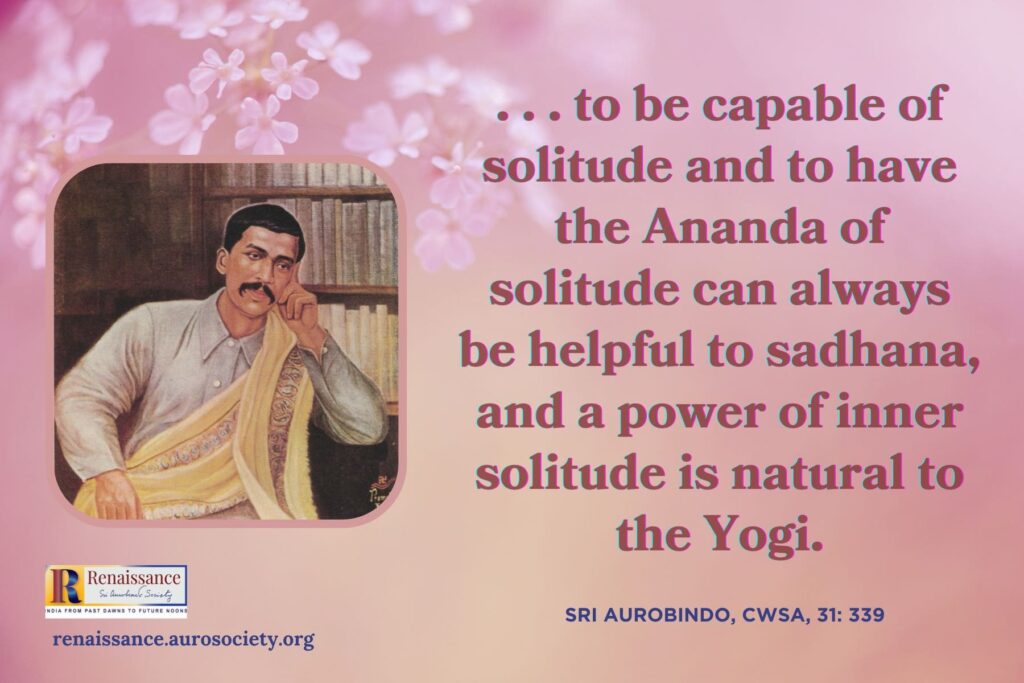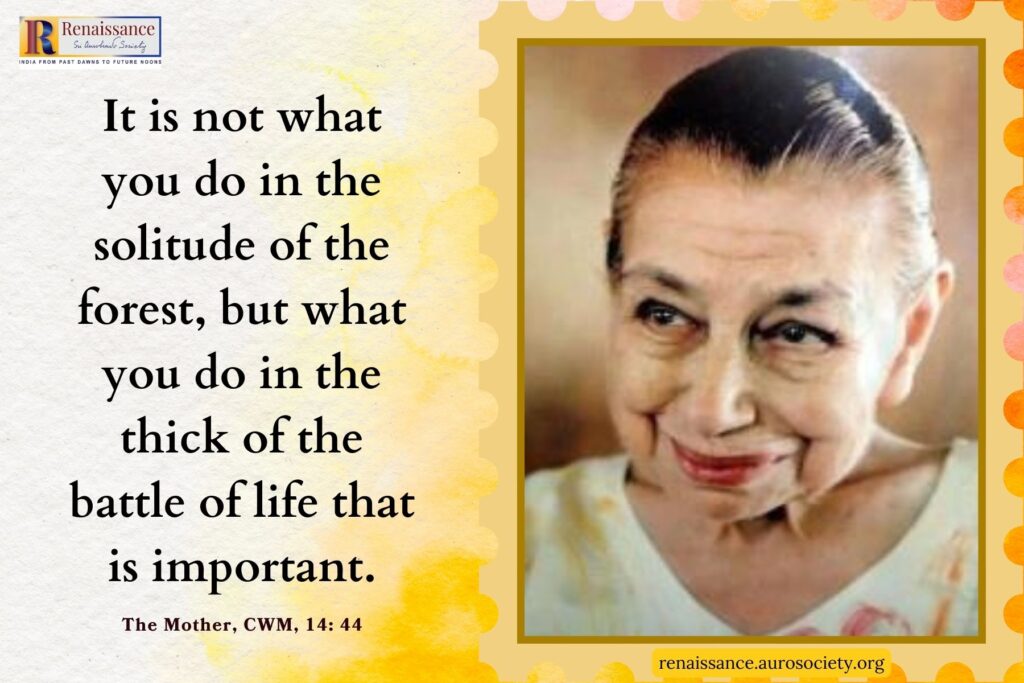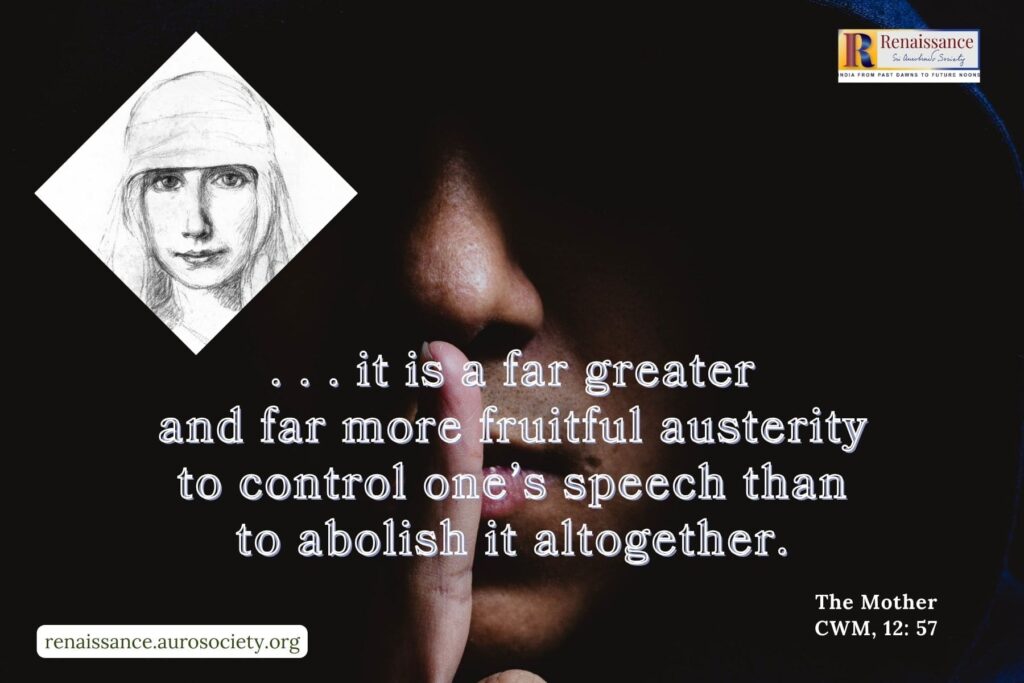Editor’s Note: Is there something like metaphysical food and sleep? The author makes us reflect on these dimensions of food and sleep and offers some valuable insights in the spirit of ‘All Life is Yoga.’

The moment we speak about the place of food and sleep in the path of Yoga, a key word to keep in mind is moderation. Everything in moderation – not veering to any extreme. The Gita states it emphatically:
नात्यश्नतस्तु योगोऽस्ति न चैकान्तमनश्नतः ।
न चातिस्वप्नशीलस्य जाग्रतो नैव चार्जुन ॥
युक्ताहारविहारस्य युक्तचेष्टस्य कर्मसु ।
युक्तस्वप्नावबोधस्य योगो भवति दुःखहा ॥
nātyaśnatastu yogo’sti na caikāntamanaśnataḥ,
na cātisvapnaśīlasya jāgrato naiva cārjuna
yuktāhāravihārasya yuktaceṣṭasya karmasu,
yuktasvapnāvabodhasya yogo bhavati duḥkhahā (BG, VI: 16-17)
Verily this Yoga is not for him who eats too much or sleeps too much, even as it is not for him who gives up sleep and food, O Arjuna.
~ See Sri Aurobindo’s explanation, CWSA, Vol, 19, p. 243
Yoga destroys all sorrow for him in whom the sleep and waking, the food, the play, the putting forth of effort in works are all yukta.
So, moderation is the watchword.
Neither sloth nor overwork. Neither being gluttonous nor staying famished. Materialism without sense indulgence and spirituality without asceticism. That’s the way of wisdom.
For the body is an instrument for the work. It has to be given its due. But in the ubiquitous narcissistic culture that we live in, we should guard against the danger of placing the body on a pedestal and not squander our lives serving its whims and fancies. In the constant sense indulgence that it demands.
We should not become the adherents of the cult of Virochana for whom the highest self was his body as we saw in that beautiful parable in Chandogya Upanishad. It is only the animal that lives to satisfy its appetites and its instincts, all on a physical level. But such a life doesn’t befit a man.
A man is a man in spite of his body.
He can conquer the limitations of his body and rise above it. His body cannot hold him down because Matter is subdued by Spirit. His spirit soars and defies the dead weight of matter. That is why even a deaf Beethoven could compose magnificent symphonies and a blind Homer could write the Iliad and the Odyssey. That is the glory of Man.
But if we are talking about food and sleep then aren’t we talking about only the physical body?
Let us explore a different dimension with regard to food and sleep – one that takes us beyond the physical body. It can be said that food and sleep do not pertain to the physical body alone but they go much deeper than the physical body. Can we think in terms of metaphysical food and sleep – food and sleep that transcend the physical?
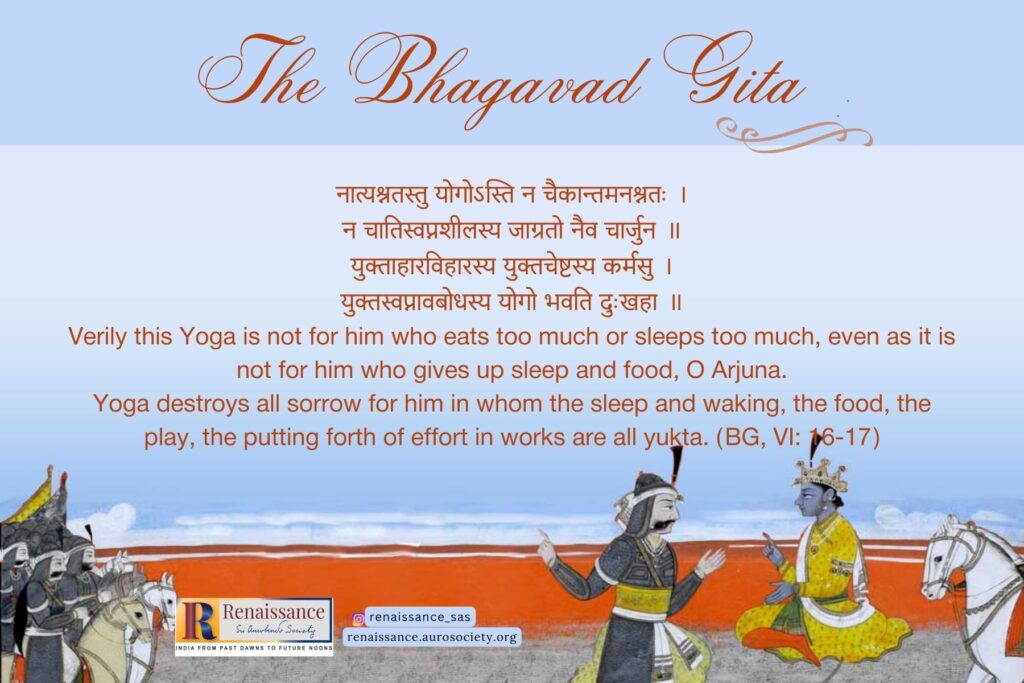
Metaphysical Food
Consider this: If we leave aside the breakfast, the lunch or the dinner, are we away from food for the rest of the day? NO! If we take the maxim, “You are what you eat” to be true, then it is truer that you are what you see, hear, speak, do and think. You are the books you read, the movies you watch, the music you listen to, the people you spend time with, the conversations you engage in, the choices that you make. These too are food in the sense of vital and mental food.
Thinking in this way we go beyond the narrow definition of food as nourishment for the body and also beyond the quality, taste etc. of the food we consume for our bodies. What all are we seeing and hearing throughout the day? What are we taking into our minds? Into our souls? Isn’t all that food too? Just as the food we consume for our physical bodies can be categorised as sattwic, rajasic and tamasic, can we also look at vital and mental food in the same way?
When we are reading a scripture like the Gita or a mystical-spiritual epic like Sri Aurobindo’s Savitri, isn’t that food for the soul?
Also read:
The What and Why of Sattwic Food
Physical food pertains to our annamaya kosha (food sheath) but the sensual and mental food pertains to our pranamaya kosha (vital sheath) and manomaya kosha (mental sheath). We may be very careful about having sattvic food for our body to help our sadhana, but if for our vital and the mental being we are taking in all kinds of rajasic and tamasic food in the form of thoughts, images, ideas and values, then it is needless to say it would severely impair our practice of Yoga. We should choose very wisely what we feed our senses and the mind with. This is what is meant by metaphysical food.
Metaphysical Sleep
If we are sleeping for a period of say six, seven or eight hours, does that mean we are awake for the rest of the time? Again, the answer is: NO! Let us explore a bit about metaphysical sleep.
I request the indulgence of the reader as I quote an extract from my book titled Eating His Money – The Antics of a Metaphysical Clown. This book contains 25 of my commentaries on the jokes of Mulla Nasrudin, the enigmatic clown. Actually, Nasrudin is a teaching method devised by Sufi Masters; and these jokes always have multiple layers of meaning which are not so obvious to the casual reader. The following extract from the book deals with the concept of metaphysical sleep:
Sleepwalking
Bedar, the Watchman, caught Mulla Nasrudin prying open the window of his own bedroom from the outside, in the depths of night.
“What are you doing, Nasrudin? Locked out?”
“Hush! They say I walk in my sleep. I am trying to surprise myself and find out.”
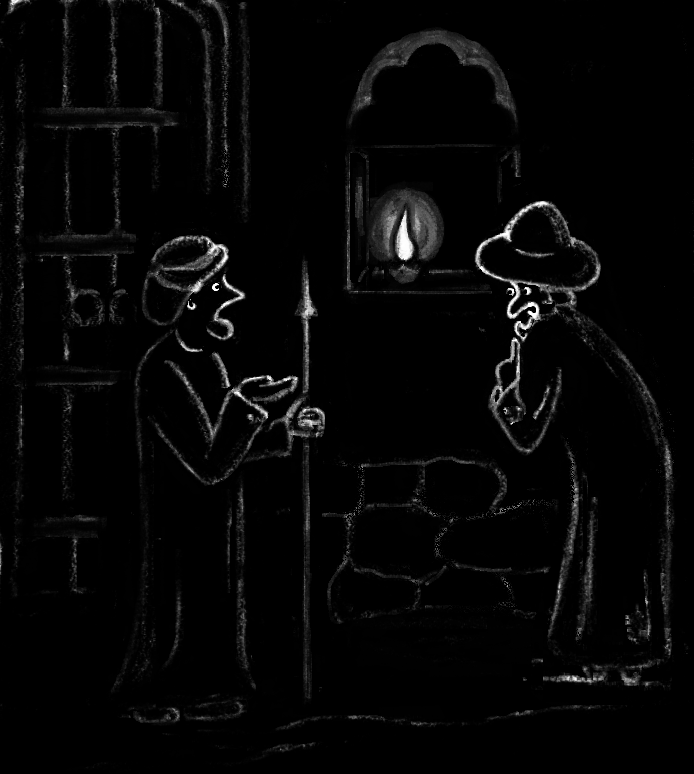
Man is asleep.
This is one of the central ideas of a most remarkable teacher who taught during the first half of the twentieth century in Europe. His name was George Ivanovich Gurdjieff. We are fascinated by the sleepwalking Nasrudin’s antics but Gurdjieff contends that we are all sleepwalking. So, what does Gurdjieff mean when he says that man is asleep? Let us try to understand.
If we closely examine and analyze the way we lead our lives, we would notice that from morning till night our days are packed with dull, repetitive and mechanical activities: brushing teeth, the morning coffee with the newspaper, shower, dressing and leaving for work. Then commuting to work, toiling away at the office desk in front of the computer, endless meetings and discussions, leaving office in the evening and reaching home; thereafter probably some short streams of conversation with family, a couple of hours before the television (nothing new there), dinner and sleep till the next day’s identical cycle of brushing teeth, morning coffee with the newspaper and so on.
And so forth for every day, every week, every month and every year. The same pattern, the same routine.
We could easily call this the life of a robot, not the life of a man who is supposed to be conscious, aware and intelligent. It is as if we are functioning on “auto mode,” or as if our individuality has been taken over by a robot. How or why does this happen?
Let us take the example of driving a vehicle. When we first learn to drive, we drive consciously. We are aware of every movement of our legs when we alternate between the clutch, the accelerator and the brakes. We shift gears and turn the steering wheel with full awareness. Our consciousness is focused on each of these activities. And on top of that we have to keep our eyes on the road, on traffic and traffic signals. Because driving is new to us and our bodies are not accustomed to it, every moment requires awareness and focus.
But a striking change happens after we have been driving for some time.
We begin to perform all the functions of using the clutch, brakes and accelerator, or shifting gears and managing the traffic pretty automatically, without much need to think or without being conscious. This is because the body has now ‘learnt’ driving and the ‘robot’ in us has taken over. Driving simply happens. The ‘robot’ simply performs the task.
What is true for driving is true for all such activities like cycling, riding a two-wheeler, walking and all the tasks we keep on repeating every day. The ‘robot’ in us performs these functions mechanically.
What Gurdjieff says is something remarkable.
He says not only our driving or cycling, but ALL our activities have been taken over by the robot! Are we conscious about our brushing teeth? How aware are we about our grooming and shower? Or about the commute from home to workplace and back? How much of our repetitive work requires original thought and imagination?
How conscious are we about the day that has passed? Have you ever wondered why do we find ourselves saying in December how quickly the year had passed? (And we say this every December, don’t we?) Why are we surprised to suddenly discover that we are in middle age and somehow feel cheated that life had flown too fast?
We are surprised because all this while we were not conscious! We were not conscious of the days, of the weeks, of the months and of the years that were passing by. This unconsciousness is what Gurdjieff calls, sleep.
The effect of this sleep is that the consciousness of man gets narrowed, the energy levels come down and we perform at a very low level of our actual potentiality. Other symptoms are boredom and lethargy.
When Gurdjieff was asked whether it is possible to ‘wake up’, he said that it is possible, but very difficult. Because the mechanicalness and the habit from which we are trying to escape is like a powerful current. After trying to swim against it for a few minutes, we gradually lose strength and go to sleep again.
When we are trapped into our routine and mechanicalness, our perception of the outer world gets dulled. We fail to notice things which are right before our eyes.
Gurdjieff says:
Any unusual effort, any new beginning has the effect of shaking the mind awake. I am normally quite out of touch with ‘reality’, almost as out of touch as when I am asleep or dreaming. I look at that tree, but I don’t really see it. My mind is elsewhere – like half listening to someone who is talking and half thinking about something else. The result is a blurring of my consciousness. Any crisis or sudden touch of ecstasy suddenly brings everything into clear focus. Things appear clear and sharp.
But with most of us, very rarely are things clear and sharp. In our state of sleep and unconsciousness, things simply happen.
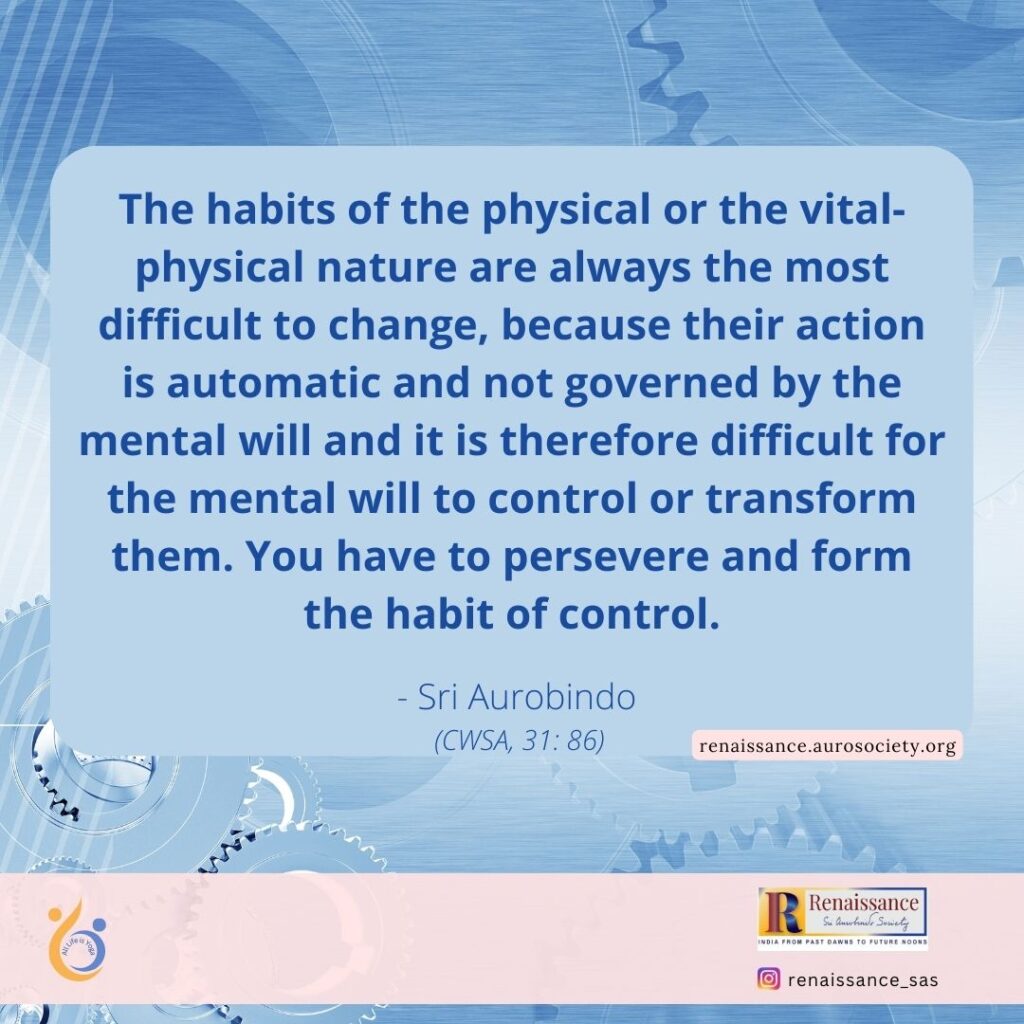
We often find ourselves doing something which we had not intended to do; we say something that we did not wish to say and behave in a manner that surprises us when we are more aware. ‘Why did I do that?’ we ask ourselves. Life turns out to be a series of accidents as we are tossed on the waves of events like driftwood.
In order to make things happen, we have to exert our will and for that we have to wake up.
It is no surprise then, that in all the spiritual traditions of the world, we find a teaching repeated again and again: Wake Up! Arise! Awake!
Are the Masters waking up their disciples from their beds in the morning? Of course not! In fact, this has been the mission of all the great spiritual masters: to awaken us; to break the sleep of unconsciousness into which we have fallen.
In the story cited above, Nasrudin tells the watchman that people say that he walks in his sleep and he wants to find out. We now understand that it is not really Nasrudin alone but we who are walking in our sleep. The essence of all spiritual practices is to awaken ourselves. Any growth, any progress is possible only if we are awake. That is why those who have attained to spiritual perfection are called ‘Awakened’. This obviously implies that the rest of us are asleep.
This sleep has also been likened to death because if we squander our lives in sleep and unconsciousness, we cannot claim to be alive. Abul Hasan Khirqani, a Sufi master is reported to have said: Many people who are in reality dead are walking in the streets; many who are in their graves are in reality alive.
In all the spiritual traditions, it is the Master who awakens his disciples from their deathly sleep.
And this happens to be the meaning of the story in the Gospels where Jesus calls forth Lazarus from his grave and brings him back to life. The raising of Lazarus from the grave is the awakening to life and wisdom brought about by the grace of the Master. Hence, Jesus proclaims: I am the Resurrection and the Life. And this rising from the sleep of unconsciousness, from the deathly sleep, is what we call rebirth and awakening.*
In the Gita also, we find a spiritual dimension given to this metaphysical sleep where it says:
या निशा सर्वभूतानां तस्यां जागर्ति संयमी ।
यस्यां जाग्रति भूतानि सा निशा पश्यतो मुनेः ॥
yā niśā sarvabhūtānāṁ tasyāṁ jāgarti saṁyamī,
yasyāṁ jāgrati bhūtāni sā niśā paśyato muneḥ (BG, II: 69)
What all beings consider as day is the night of ignorance for the wise, and what all creatures see as night is the day for the introspective sage.
What is day and a waking state for us, i.e., our ordinary, materialistic, sensual life, is the night of ignorance for the wise. And what the Yogi considers to be a day, an awakened life, is night for us because we are asleep to that reality.
In his Essays on the Gita, this is how Sri Aurobindo explains the verse:
It is a reversal of the whole view, experience, knowledge, values, seeings of earthbound creatures. This life of the dualities which is to them their day, their waking, their consciousness, their bright condition of activity and knowledge, is to him a night, a troubled sleep and darkness of the soul; that higher being which is to them a night, a sleep in which all knowledge and will cease, is to the self-mastering sage his waking, his luminous day of true being, knowledge and power.
~ CWSA, Vol. 19, p. 103
For the life of Yoga, not only do we have to have moderation in everything as enjoined in the Gita, but we must also be vigilant about our sensual and mental food and awaken ourselves from our metaphysical sleep.
* * *
Notes:
* Readers interested to explore further the teachings of Gurdjieff and this subject of metaphysical sleep may refer to the chapter titled Man is Asleep from the author’s other book An Odyssey of the Mind – Journeys in the Modern Mindscape.

Read more from the author HERE.
~ Design: Beloo Mehra and Kavita Dutta

